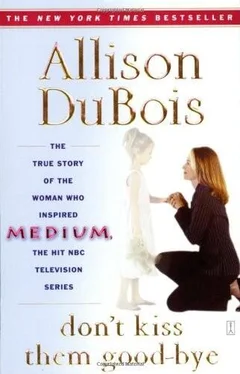Sometimes a living loved one is looking to hear a particular word. Despite highly specific information given to them, they feel disappointed or annoyed if the reading doesn’t go according to their own agenda. Instead, the reading follows the agenda of their loved one on the other side.
Look at it from a spirit’s perspective. Imagine you desperately want to talk to someone whom you have waited ten years to talk to. You only have thirty minutes to say everything that you want to say to them. You want to fill a void and be acknowledged as being with them in their present life. This may be your only shot at letting your loved one know how you feel. What would be important? What would you say? That you love them, that you are sorry, their name, names of people who are with them, memories or objects that have emotional value.
You probably wouldn’t be worried about a code word; you’d be too busy expressing emotion, whether it was love, happiness, or regret. You’d want to touch your loved one’s heart. So if you’re lucky enough to make contact with a loved one, hear their message and allow them to touch you. Let go of your agenda.
“Psychic” Is a Dirty Word
One day I found myself on a show where a poll was taken of the audience to see who did or didn’t believe that mediums can communicate with the dead. The host said, “Who believes that psychics are frauds, and who’s gullible and misguided?”
I couldn’t believe he would ask such a leading question to try and sway his audience. I was sitting quietly, waiting to do a taped reading for the show, when the camera crew began mocking the topic of the show. They were making ghost sounds and laughing hysterically. I mentally shut down and decided I didn’t care about the reading.
The sitter ended up being skeptical and emotionally closed off anyway. It seemed as if she came in only to prove us wrong. I received confirmation on the two names provided by her father on the other side, but those relatives meant little to her, so she was unimpressed. She didn’t take into account that they meant a lot to her father. I also named a hugely important and unique object connected to her father’s death, but at that point we were informed our time was up.
Oh well, I thought, at least it’s over. I had had only three and a half hours of sleep the night before, because of a five A.M. flight, so I was looking forward to a nap.
Every time the word “psychic” was mentioned at this appearance it was delivered with sneers and contempt, like a dirty word. Anyone who admitted that he believed in psychics was ridiculed and quickly shot down. Such reactions aren’t limited to this particular show. That’s partly because of people who pass themselves off as psychics to con people out of money. You have to remember that every profession has its share of liars and criminals. Anyone who wants to consult a psychic should ask a friend for a recommendation or ask for references to avoid being conned.
As a medium who had definitely paid her dues, I didn’t appreciate being ridiculed by a group of relative strangers. But this experience was a blessing in disguise. Wondering why I bother to be a public figure in this field, I learned a valuable lesson: to not let hostile nonbelievers drive me from my path in life.
As I say, nobody breaks a glass ceiling without being cut.
What Makes a Skeptic?
When a skeptic hears the word “psychic,” he will usually go on the defensive right away. There is a stigma attached to the word, but I have learned to never be ashamed to own the ability. To see things that most can’t or won’t is nothing less than a wondrous gift.
There is nothing wrong with being something of a skeptic. Skeptics are on the fence. They aren’t sure one way or the other and they’re not easily persuaded. If they receive detailed, specific information, they can become believers. If they don’t hear what they need to, they continue to have doubts about the afterlife, but remain somewhat open to the possibility. I can understand and wholeheartedly respect their stance. Not only are they entitled to their beliefs, they are wise to have a healthy sense of doubt.
Angry skeptics are a different story. These are people who project their anger stemming from the loss of someone close to them onto issues dealing with the unknown. They tend to have abandonment issues. An angry skeptic can also be a person who feels superior in intelligence to the rest of society, therefore thinking everyone else is dumb or gullible. They also tend to see any sign of emotion as weakness.
They make mediums the target of their anger as they protect the less capable from us. They tend to talk loudly to drown out a medium’s response to their question, which was really more a statement, anyway. They tend to make ridiculous arguments against the other side: “I talk to my dead aunt but she doesn’t talk back.” It never occurs to angry skeptics that they are so closed off that they are incapable of hearing those who have passed on. Plus, they obviously lack mediumistic energy. The entire population isn’t expected to hear the dead.
Angry skeptics tend to present arguments such as “Mediums are too general.” Okay, sometimes people die of heart attacks and some are named Michael, like my dad. Should a medium not acknowledge the spirit of a loved one because his death wasn’t unique enough or his name is too common? Mediums acknowledge whoever comes through, and it would be stupid of us to ignore a spirit because it doesn’t meet with skeptics’ approval. The general information has to be delivered; it’s a part of the spirit. However, some personally specific information should surface as well.
I came to the realization that I could spend my entire life trying to please difficult people like this, but what a waste of time and energy that would be. Besides, they are a minuscule group. For a long time I felt it necessary to acknowledge angry skeptics personally, to try to make them understand that what mediums do is the most innately human of functions: We connect. But now I ignore these people.
If an angry skeptic won’t acknowledge the spiritual aspect of the afterlife and won’t acknowledge our scientific approach to the afterlife, then it’s his own hang-up. If a person is raising his voice and turning red when talking about life after death, then he needs to assess why he feels so enraged and whether he needs to seek help with issues.
What are angry skeptics so afraid of? That most people do believe in an afterlife and this forces them to acknowledge their life choices? That their words and actions are being witnessed by those they’ve lost? Angry skeptics are the same people who insisted the world was flat. They are afraid of what they might find if they explore the unknown. Now that healthy skeptics and unhealthy skeptics have been defined, here’s to staying healthy!
Boundaries
It’s so important for everyone to create boundaries in her life. Here is an example of one that I felt I owed it to myself to draw. Young mediums need to consider what makes them comfortable with their gifts. They are also entitled to establish boundaries and know that they deserve the same courtesy as everyone else.
If I had a quarter for every time I had a person look at me and say, “I am a skeptic, but tell me, how many kids do I have,” or “What am I thinking of right now?”
As if I live simply to provide amusement.
I will not pick lottery numbers for skeptics or entertain them at social gatherings. Skeptics need to remember that mediums are people with lives and we deserve to be treated with respect. It’s not necessary to offend us, especially at a social function. I can respect a skeptic not believing in the other side—that’s their belief; respect mine.
Читать дальше












